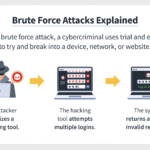Cryptography, the art and science of securing communication, has become increasingly pivotal in our digital age, particularly as cyber threats loom larger. For aspiring researchers in India, venturing into this burgeoning field requires a strategic approach. This article delineates a comprehensive roadmap for those interested in cryptography research, presenting various resources and outlining the necessary steps to carve a niche in this domain.
Understanding Cryptography: The Foundation
Before embarking on a research journey, it is imperative to grasp the fundamentals of cryptography. This encompasses both classical cryptography techniques and modern algorithms, such as symmetric and asymmetric encryption. Familiarizing oneself with the historical context of cryptography, from the Caesar cipher to public-key infrastructure, illuminates the evolution of secure communication methods. Engaging with literature, including academic journals and textbooks, lays a robust groundwork.
Educational Pathways: Formal Education
Aspiring cryptographers often initiate their journey through formal education. A bachelor’s degree in computer science, mathematics, or a related field is a quintessential starting point. India boasts numerous esteemed institutions offering specialized courses in information security and cryptography. Institutes like the Indian Institutes of Technology (IITs) and National Institutes of Technology (NITs) are particularly renowned for their rigorous curricula.
Postgraduate education further enhances one’s expertise. Master’s programs and Ph.D. opportunities focusing on cryptography, security protocols, and mathematics, such as university offerings at IITs or premier universities like IIIT Hyderabad, are invaluable. Graduate studies not only provide theoretical knowledge but also cultivate analytical and problem-solving skills crucial for cryptography research.
Research Areas: Identifying Your Niche
Cryptography is a multifaceted domain with numerous sub-disciplines. Potential researchers should seek to identify specific areas of interest, which may include symmetric cryptography, public key cryptography, cryptographic protocols, or post-quantum cryptography. Each area encompasses unique challenges and evolving technology trends, necessitating an understanding of contemporary research efforts and future demands.
Focusing on a niche allows researchers to specialize, contributing to existing dialogues and finding innovative solutions to pressing problems. Engaging in discussions, attending conferences, and following recent publications can aid in discerning where personal interests align with industry needs.
Accessible Resources: Books and Journals
Accessing high-quality resources is crucial for research. A plethora of books and academic journals cover advanced cryptography topics. Some indispensable texts include “Cryptography and Network Security” by William Stallings and “Applied Cryptography” by Bruce Schneier. These books provide comprehensive insights into both theoretical foundations and practical implementations.
Furthermore, seminal papers published in reputed journals, such as the Journal of Cryptology or IEEE Transactions on Information Theory, are vital in staying abreast of cutting-edge developments. Online platforms also offer access to various research papers and articles, facilitating the exploration of new cryptographic methodologies.
Online Courses and Workshops
In the digital era, online learning platforms have proliferated, offering courses tailored to cryptography enthusiasts. Platforms like Coursera and edX provide access to courses featuring modules on cryptography taught by university professors. For instance, Stanford University’s online course on “Cryptography” covers essential algorithms and protocols, equipping learners with essential skills.
Participating in workshops and hackathons focused on cryptography further bolsters practical knowledge. Such events foster collaboration and provide hands-on experience in overcoming real-world security challenges. Networking with fellow participants can often lead to collaborative research avenues.
Engaging with the Community: Conferences and Seminars
Active participation in cryptography conferences and seminars is an indispensable aspect of immersing oneself in the field. Prestigious events like the Crypto Conference or Eurocrypt not only showcase the latest research but also provide forums for networking with established professionals and fellow researchers.
India hosts its own array of seminars and workshops, such as the Indian Conference on Cryptology and Network Security (ICACNS), facilitating local engagement. Presenting research findings at these forums can significantly amplify one’s visibility within the community and foster collaborations that propel research forward.
Internships and Research Positions: Practical Experience
Gaining practical experience is paramount. Seeking internships in organizations specializing in cybersecurity, governmental institutions, or academic labs provides hands-on engagement with cryptographic systems. Such positions often involve tackling real-world encryption challenges, allowing for the application of theoretical knowledge in tangible scenarios.
Moreover, applying for research assistant positions under esteemed scholars expands exposure to ongoing research projects. Collaborating with experienced researchers cultivates mentorship relations and nurtures insight into the intricacies of cryptography research.
The Role of Open Source Projects
Contributing to open source projects is an invigorating way to enhance programming skills while participating in a global collaborative effort. Platforms like GitHub harbor numerous cryptography-related projects where aspiring researchers can contribute enhancements or develop new features. This participation not only bolsters technical competencies but also cultivates a sense of community within the cryptographic field.
Continued Learning and Adaptation
Cryptography is a dynamic field, perpetually influenced by technological advancements and emerging threats. Researchers must adopt a mindset of continuous learning, staying informed of trends like homomorphic encryption or blockchain technology. Following respected cryptographers and institutions through social media or online forums allows individuals to stay engaged with the evolving landscape.
As the landscape of information security evolves, the importance of cryptography research in safeguarding communications cannot be overstated. For those willing to explore this intricate field, a structured approach combining education, engagement, and practical experience can pave the way for a rewarding and impactful career in cryptography. The roadmap outlined here serves as a guide, elucidating the multifaceted journey to becoming a proficient cryptography researcher in India.









Leave a Comment